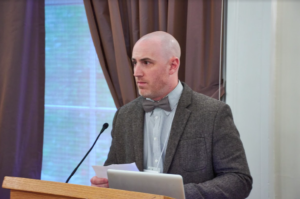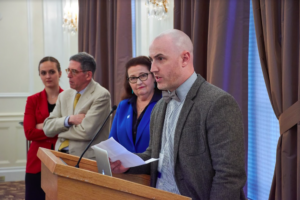
To Mark Barga, the 2017 winner of the Teacher RFK Urban Education Award, “the true test [of a student’s education] is not what grade they will receive in my class, but how well prepared and motivated they are to fight for a more democratic and just world for themselves and those who will follow.” Barga’s belief that education should connect to students’ personal lives and contexts is a common thread in every story he tells– from how he got his start in teaching to the friendships he’s cultivated with his students.
After taking a corporate job in Chicago, Barga found himself feeling “completely wayward.” However, after spending time with his then-girlfriend (now wife), who worked at Head Start on Chicago’s South Side, he was reminded of his “foundational calling and commitment to justice.” Barga was inspired to leave the corporate world, and he’s been a teacher ever since, nearing a decade working in urban classrooms.
Barga’s perspective and teaching style are peppered with passion and a genuine interest in his students as people. Barga told us about a recent project he led, wherein students studied the Civil Rights and Black Power Movements of the 60s/70s in order to examine a modern-day movement. Specifically, they looked at “Black Lives Matter…from 3 perspectives – Elaine Brown, a former Black Panther and severe critic of BLM; Shaun King, a writer for the New York Post and active BLM supporter, and Brendan Bradley, a writer for The Hill and a conservative critic of BLM.” Classroom discussions during this unit were “intense, spirited, informed, and rich,” as students enthusiastically “engaged and thought seriously about important issues.” Learning from the different perspectives not only got students thinking critically about their own opinions, but they came to understand different approaches to working toward freedom, safety, and respect for all.
 Another way Barga works to encourage critical thinking in his students is by framing questions in ways that go beyond yes or no to spark reflection. “’How should the United States address mass incarceration?’ has far greater legitimacy in my classroom than ‘should the United States address mass incarceration?’,” says Barga. “The majority of my students’ lives have been marred by mass incarceration, so a question like this is not an abstraction – it is as ‘real’ as it gets,” he explains. The students’ journeys and unique perspectives help shape class discussions to give their learning relevancy to their lives. In answering a question like this, students conduct rigorous research, reflect on their personal experiences and how incarceration has impacted their families, and are able to engage in passionate debate in the classroom.
Another way Barga works to encourage critical thinking in his students is by framing questions in ways that go beyond yes or no to spark reflection. “’How should the United States address mass incarceration?’ has far greater legitimacy in my classroom than ‘should the United States address mass incarceration?’,” says Barga. “The majority of my students’ lives have been marred by mass incarceration, so a question like this is not an abstraction – it is as ‘real’ as it gets,” he explains. The students’ journeys and unique perspectives help shape class discussions to give their learning relevancy to their lives. In answering a question like this, students conduct rigorous research, reflect on their personal experiences and how incarceration has impacted their families, and are able to engage in passionate debate in the classroom.
Barga believes deeply that the teacher is just as much of a “learner” as the students in a classroom. Each student has their own story, their own trials and successes, and he has learned from them all. “One of my students survived four gunshots and endured a harrowing road to a full recovery. Another one of my students [is] a scholar at an elite university in New York and performs spoken-word poetry all over the country. Both students have enriched my life and added perspective and depth in ways that would have been nearly impossibly to cultivate were it not for our our time together,” Barga tells us. “My students give me an appreciation for the resilience of the human spirit, a drive to never stop learning as a teacher, a daily reminder of the complexity of our identities, and a visceral awareness of my privilege as a middle-class, educated, straight-cisgender-white-male and the responsibility I have to all of my students to work to deconstruct those forms of unearned security.” Real-world learning happens here, too, with teachers and students learning from each other, together, in order to forge connections between different groups of people and issues.
As a history teacher, Barga said that “being recognized as an educator who is striving to embody the principles of Robert F. Kennedy is an honor I treat with great seriousness, and I am humbled by the notion that my work is viewed as sharing the spirit of his vision for this nation – a pluralistic, multi-racial, and more just democracy.” These stories of togetherness, community, and inclusivity that define his classroom appear in everything he touches: “It is through this community that we remain connected to the fundamental and underlying power of what we do and why we do it. If we commit ourselves to justice and compassion in education we must not stand alone,” Barga concludes.

